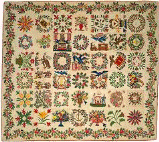Textile Society of America

Textile Society of America: Symposium Proceedings
Date of this Version
1996
Document Type
Article
Citation
Published in Sacred and Ceremonial Textiles: Proceedings of the Fifth Biennial Symposium of the Textile Society of America, Chicago, Illinois, 1996. (Minneapolis, 1997).
Abstract
Whenever I mention I am going to give a talk on laundry, almost every listener responds with a personal recollection. Susie Brandt, an artist whose work attends to the details and obsessions of daily life, was reminded of her Laundromat days in Chicago when she was a graduate student in the Fiber Department at The School of the Art Institute. In her neighborhood were many recent immigrants from Mexico. She noticed that they washed their clothes with the washers' lids open, swishing their hands in tandem with the agitators' motion. Was it disbelief in the power of the machine to do a thorough cleaning? Or was it desire for a manual task to authenticate the cleaning process? Susie's story suggests that the physical task remains the essence in the ritual of laundry.
Laundry has the power to elevate one's spirit. Kathleen Norris wrote "Laundry has an almost religious importance for many women. We groan about the drudgery but seldom talk about the way it saves us, the secret pleasure we feel at being able to make dirty things clean, especially the clothes of our loved ones, which possess an intimacy all their own. Laundry is one of the very few tasks in life that offers instant, gratifying results."1
This is one view of laundry, but ritual encompasses demeaning repetition as well as celebratory renewal. Laundry, and especially the occupation of laundress, is seen as one of the great subjugators of women. Praising laundry for its ritual component may result from the ease with which it is completed today. What was in the past an onerous task becomes pleasant activity because the drudgery is removed. Whatever the reasons, finding delight in the ritual acknowledges the ceremonial significance. The sacredness that laundry implies is cleanliness; to launder is prized because both the activity and the result sanctifies. Cleanliness is next to godliness, and a goodly amount of power rides on that.


Comments
Copyright 1996 by the author.